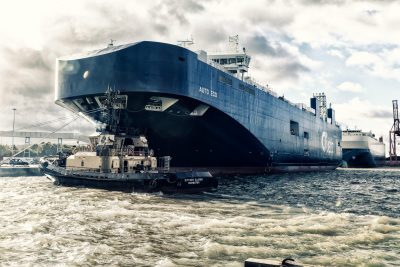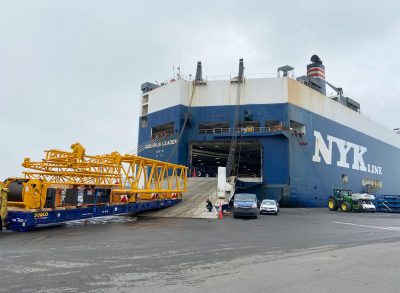- <
- Home ›
Importing Goods Into the UK

Customs Checklist
Before you import goods into the UK, you’ll need customs clearance from HMRC. We can help you manage that.
Simply coordinate with our shipping experts, and they’ll communicate with HMRC on your behalf. To do so, we will need your:
- EORI Number
- Customs Commodity Code
- Freight and Insurance Costs
- Deferment Authority
- Bill of Lading
- Commercial Invoice
- Duty & VAT Payment
- Additional Documentation
Below, you’ll find everything you need to know about these documents, and more.
EORI Number
What is an EORI Number?
It is an HMRC-designated number for any business involved in export or import. This number uniquely identifies your business at any border your goods may cross.
This 12-digit number, preceded by the letters GB, is a requirement for any business, Sole-Trader or otherwise, involved in exports and imports. If you haven’t applied for an EORI number, do so before you begin the process.
Register for an EORI Number:
Do my personal imports need an EORI?
When importing goods into the UK, you'll need to register with HMRC.
A private individual importing goods for personal use would not need an EORI number in most cases.

Customs Commodity Code
What is a Customs Commodity Code?
A commodity code is used by HMRC to determine the VAT rates and duty payable on goods that are imported into the UK.
The codes for the tariff in the UK are found in Volume 2 of the Integrated Tariff of the United Kingdom. They can also be seen in the EU TARIC data.
A UK tariff code is made of 10 characters and uses a coding system that identifies shipped items in a way that every customs authority understands. The process of choosing a code can be fairly straightforward, but particular types of goods can be very confusing. This is especially true if you don't have a lot of knowledge about what's happening with tariffs.
How to get help with your Customs Commodity Code?
You can email the HM Revenue & Customs Tariff Classification Service with your questions, but with Premiership, it’s easier to come to us. We work hard to provide you with the information you need and make things just as easy as possible for you.
Freight and Insurance Costs
What are Freight and Insurance Costs?
The amount you paid for shipping and insurance from the point of origin to the port of arrival in the UK.
Why do I need to include Freight and Insurance costs?
To calculate import duty and VAT. Customs require these details to determine the correct amount of VAT and import duty that you will pay.
Bill of Lading
What is a Bill of Lading?
Freight cannot be moved without a Bill of Lading. This legally binding document contains the information necessary to process and invoice the freight correctly. It is essentially a contract between a freight carrier and shipper.
Where will I get a Bill of Lading?
When companies overseas accept your goods, they'll issue you with a Bill of Lading or Air Waybill which creates a contract. The acceptance of your goods with these documents creates a contract. This includes the terms and conditions under which the shipping - or airline agrees to move your goods.
What happens if I get a Bill of Lading at Origin?
If a company issues an Original Bill of Lading at the origin, it will be forwarded to you (the consignee) so that you can surrender it to the shipping line. This will enable them to release the goods to you. However, if they are using Express Bills or Sea Waybills, you won't need an original Bill of Lading, as long as you agree that you are the consignee and entitled to the goods.
This means that if an original bill has been issued, you will need to either:
Send the original bill document to us
Send the original bill document to the carrier agent or liner
What happens if I don’t have a Bill of Lading?
You won’t be able to release your goods once they arrive in the UK. The original bill must be presented to prove that you have ownership over these goods.
The company or person who sold the goods will usually send the Bill of Lading to you by post when you purchase their product online. But, if you purchase them with a letter of credit, then you'll need to request the Bill of Lading from the bank that was involved with the transaction.
Commercial Invoice
Why do I need a commercial invoice?
As the Supplier, Shipper or Consignor, the individual or company from whom you bought the goods must provide you with a commercial invoice. This must include a certain amount of details including:
Their name and contact details
Your name and contact details
A description of the goods purchased
A statement defining the number of packages that the goods are contained in
The total value of the goods
The currency in which the value of goods is measured
You’ll find the HMRC customs value of imported goods here.
Duty or VAT Payment
You have two options when it comes to paying duty or VAT:
Pay directly to HM Revenue and Customs
Charge it to a Deferment account (similar to running up a bar tab!)
By deferring the payment, you can then ensure that you pay at a time that is convenient for you. Within reason of course!
If you're using a deferment account, you’ll have to email us a request to charge duty and VAT to that account. We can’t process any transactions without this authorisation in writing.
If you don't have a deferment account, that's not a problem. We offer different payment options to suit your needs.
Eager to learn more? Just get in touch with us and one of our specialists will advise and inform you as to our capabilities.
Additional Documentation
In some cases, we may need:
Preference Certificate
Certificate of Origin
Import Licence
In each case, the certificates supplied must be the originals to support your claims.
What is a Preference Certificate?
Preference Certificates are used by importers to attain reduced levels of duty.
These certificates are limited in their use for obvious reasons and can only apply to select types of goods, from a short list of countries.
A couple of common examples of these certificates include the GSP (Generalised System of Preferences) certificate and the EUR.1 movement certificate.
With our help, we can arrange your goods for import, raise the certificate and ensure that it is stamped and endorsed in its country of origin.
Why do I need a Certificate of Origin?
Tightly controlled audit practices on imports mean that you must prove where your goods come from. This is especially vital for those importing textiles for industry.
Just like preference certificates, our services can help you ensure that your certificates are raised, stamped and endorsed in the country of origin of your goods.
Do I need an Import Licence?
Once you have selected your customs commodity code, or checked out HMRC’s import code licensing you may discover that you are required to request an import licence.
However, the vast majority of goods do not need an import licence.
What are Certificates of Free Sale?
A CFS (Certificate of Free Sale) is required for any imported goods that will come into contact with humans. These can include, but are not limited to:
Cosmetics
Medicines
Food & Drink Supplements
They are only used for countries that have lower product safety, regulatory systems and enforcement than the UK in order to determine that they meet the UK’s high safety standards.
So, that’s all the documentation we need to process your customs checks. But what happens next.
Customs Clearance - What to Expect
The agencies and authorities of goods have complete control over all goods in a port until they officially release them. This customs clearance from the UK Border Force and HMRC is only finalised once every authority has released its control.
The movement of goods through ports and airports is governed by several authorities working in tandem. These include:
HM Revenue & Customs
Port Authority
Trading Standards
Forestry Commission
Animal & Plant Health Agency
Each takes special interest in commodities relating to their particular purview - foodstuffs, electrical goods, plants etc.
Goods consisting of foodstuffs have the potential to face far higher levels of checks than other goods. You will require vast amounts of details of the goods to successfully pass safety audits - and these apply whether the food is fresh, frozen or chilled.
These agencies and authorities act to ensure the high standards and legislative requirements of the UK are met in every import.
However, for the vast majority of products that are non-animal and non-plant in origin, it’s far simpler. You will need only the Commercial Invoice and Bill of Lading to approve your goods for import.
Pick Up Your Imported Goods
Once your import has:
Paid applicable tax
Paid applicable duty
Presented Shipping Line with Bill of Lading or Express Release waybill
Been released by Customs and other Agencies
It is then available for pick up or delivery.
Following your successfully imported goods, you will then need to either:
Arrange delivery to desired destination
Talk to us and we’ll arrange delivery via our range of services
Pick up your goods directly from the port or airport (however, some goods are not available for direct pick up from a port.)
Regardless of your selected form of pickup, an appointment must be made with the port’s authority and a prearranged time, and the fees and costs paid upfront to facilitate the pickup.
From full containers to specialised cargo, our range of services is equipped with the specific handling and delivery vehicles required to coordinate the pickup of your goods.
Rent and Demurrage
You need to arrange pickup of your goods as soon as you can, and preferably at least a week in advance of your goods arriving. If you fail to do so, your goods will sit in port and you will be charged fees in the form of rent and demurrage.
There is a limited time frame of zero charges for goods. These are:
- Air Freight goods - 24 hours
- Specialised Shipments - 3 days
- Normal Shipments - 5-7 days
For normal shipments, the length of time of which goods can sit in port without paying fees is determined on the line.
To avoid these situations, and to facilitate your supply chain, talk to us. With our freight services, we can expedite and optimise the entire process from a product’s country of origin to its designated destination within the UK.
The Key to Imports
We have a versatile and scalable shipping fleet that works across the entire globe. Our cost-effective and secure services ensure that your goods get to you safe and sound and at a price that won’t hurt your bottom line.
You’ll also be able to track your cargo with our cargo tracker to ensure that you are fully updated on the situation of your goods. With a dedicated, experienced team that understands Customs requirements, we’ll help to ensure that your goods face zero problems as they cross the border into the UK.
Stay secure and efficient, with Premiership.